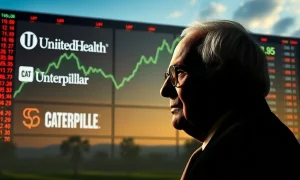Billionaire investor George Soros, renowned for his astute market predictions, recently amplified his stake in Nvidia. This significant move highlights his strategic focus on artificial intelligence. Many investors now watch his portfolio closely. His firm, Soros Fund Management, significantly boosted its holdings. This action underscores a growing trend. Major players are increasingly investing in AI. Specifically, the George Soros Nvidia investment draws considerable attention. It signals strong confidence in the chipmaker’s future. The firm’s latest 13F filing revealed these changes. Consequently, the market is buzzing with speculation. This report examines Soros’s AI strategy. It also explores the implications for the broader tech sector.
George Soros Nvidia: A Strategic Bet on AI
Soros Fund Management, a prominent investment firm, notably increased its position in Nvidia during the first quarter. Filings show the firm purchased an additional 336,400 shares. This pushed its total holdings to 365,000 shares. The value of this stake now exceeds $240 million. This substantial increase positions Nvidia as a top holding for Soros. Furthermore, it reflects a strong conviction in the burgeoning AI market. Nvidia stands as a key player in this sector. Its graphics processing units (GPUs) power advanced AI computations. Therefore, Soros’s move suggests a belief in Nvidia’s continued dominance. This investment aligns with broader market trends. Many institutional investors are now flocking to AI-related stocks. The George Soros Nvidia stake exemplifies this trend. It highlights the perceived long-term growth potential of artificial intelligence.
Historically, Soros has demonstrated a knack for identifying lucrative opportunities. His past investments often precede significant market shifts. Consequently, his latest actions carry considerable weight. The decision to supercharge Nvidia holdings is not isolated. It forms part of a larger strategy. This strategy focuses on companies at the forefront of technological innovation. Specifically, AI represents a transformative force. Its applications span various industries. These include healthcare, finance, and autonomous vehicles. Nvidia’s technology is foundational to these advancements. Thus, Soros’s investment is a calculated move. It aims to capitalize on this technological revolution.
Decoding Soros Fund Management’s AI Portfolio
Beyond Nvidia, Soros Fund Management has diversified its AI exposure. The firm also acquired new stakes in several other companies. These firms are integral to the artificial intelligence ecosystem. For instance, new positions include:
- Palantir Technologies (PLTR): A data analytics company with strong AI capabilities.
- Amazon (AMZN): A tech giant with significant investments in cloud computing and AI services.
- Alphabet (GOOGL): Parent company of Google, a leader in AI research and development.
These additions underscore a comprehensive AI investment strategy. Soros’s firm is not merely betting on one company. Instead, it is investing across the AI value chain. This approach mitigates risk. It also maximizes potential returns. Each company plays a unique role. Palantir offers AI-powered data solutions. Amazon Web Services (AWS) provides crucial cloud infrastructure for AI. Alphabet leads in foundational AI models and applications. Therefore, the portfolio reflects a nuanced understanding. It targets various facets of the AI industry. The significant George Soros Nvidia stake, however, remains a cornerstone. It highlights the importance of hardware in the AI revolution.
Furthermore, the firm reduced some of its existing holdings. This indicates a reallocation of capital. Money is shifting towards high-growth AI opportunities. Such portfolio adjustments are common for active managers. They continuously seek optimal risk-adjusted returns. Soros’s history suggests a willingness to make bold bets. These bets often involve emerging technologies. The current AI boom presents such an opportunity. The firm’s recent filings offer a snapshot. They reveal a clear commitment to this sector. Investors closely monitor these filings. They provide insights into the strategies of influential figures.
Why Nvidia is Central to AI’s Future
Nvidia has cemented its position as a critical enabler of artificial intelligence. Its GPUs were initially designed for gaming. However, their parallel processing capabilities proved ideal for AI workloads. Training complex AI models requires immense computational power. Nvidia’s hardware provides this power efficiently. Consequently, the company dominates the AI chip market. Major tech firms rely on Nvidia’s solutions. These include Google, Meta, and Microsoft. The demand for Nvidia’s chips continues to surge. This is driven by rapid advancements in AI. New applications and models emerge constantly. Therefore, Nvidia’s role is indispensable. The George Soros Nvidia investment acknowledges this pivotal position.
The company also develops extensive software platforms. CUDA, for instance, is a programming model. It allows developers to utilize Nvidia GPUs for general-purpose computing. This ecosystem creates a strong moat. It makes it difficult for competitors to catch up. Nvidia is not just a hardware provider. It is a comprehensive AI platform company. Its innovations extend to:
- Data centers: Providing powerful servers for AI training and inference.
- Autonomous vehicles: Developing AI platforms for self-driving cars.
- Robotics: Enabling intelligent machines with advanced perception.
These diverse applications ensure long-term growth. Analysts widely predict continued strong performance for Nvidia. The company’s financial results consistently exceed expectations. Its revenue growth is robust. Profitability remains high. Investors view Nvidia as a bellwether for the AI industry. Its success often signals broader sector health. Therefore, Soros’s increased stake reflects confidence. It indicates a belief in Nvidia’s sustained leadership. It also suggests a positive outlook for the entire AI landscape.
Implications for Investors: Following Soros’s Lead?
George Soros’s investment moves often generate significant interest. His firm’s substantial increase in George Soros Nvidia shares could influence other investors. Some might interpret it as a signal. They might consider it a strong endorsement of Nvidia. However, retail investors should exercise caution. Mimicking institutional investors directly carries risks. Large funds operate with different time horizons. They also possess different risk tolerances. Furthermore, their access to information and resources is extensive. Individual investors should conduct their own thorough research. Investment decisions must align with personal financial goals. They should also match individual risk profiles.
The AI sector, while promising, also presents volatility. Valuations for some AI companies are high. This reflects significant future growth expectations. Market corrections can occur. Therefore, diversification remains crucial. Investors should avoid concentrating all their capital in a single stock or sector. While Soros’s confidence in AI is notable, it is one perspective. The broader market sentiment can shift rapidly. Understanding the underlying fundamentals is vital. This includes:
- Company financials and revenue growth.
- Competitive landscape and market share.
- Technological innovation and future product pipeline.
Ultimately, Soros’s actions provide valuable insight. They highlight the increasing importance of AI in investment portfolios. However, they are not a guaranteed roadmap to success. Informed decision-making requires independent analysis. It also demands a clear understanding of market dynamics. The significant capital allocated by Soros underscores the perceived opportunity. Yet, it also emphasizes the scale of conviction required for such bets.
The Broader Landscape of AI Investments
The AI revolution is rapidly reshaping industries worldwide. Companies are pouring vast resources into developing AI capabilities. This extends beyond chipmakers like Nvidia. It includes software developers, cloud service providers, and data infrastructure companies. The demand for AI talent is also skyrocketing. Governments are investing heavily in AI research. They recognize its strategic importance. The competitive landscape is intense. Innovation drives rapid change. New AI models emerge regularly. These models push the boundaries of what machines can achieve. Consequently, the investment opportunities are vast. The George Soros Nvidia investment is a prominent example. Yet, it represents only a fraction of the total capital flowing into AI.
Furthermore, the ethical considerations of AI are gaining prominence. Discussions around responsible AI development are ongoing. Regulations are also beginning to take shape. These factors will influence the long-term trajectory of the industry. Investors must consider these broader implications. The growth of AI is undeniable. Its impact will continue to expand. This creates both immense opportunities and complex challenges. The current surge in AI investments reflects optimism. It signals a belief in AI’s transformative power. This trend is likely to continue for the foreseeable future. However, careful navigation of this dynamic sector is essential. Identifying sustainable growth drivers is key.
Conclusion
George Soros’s substantial increase in his Nvidia stake sends a clear message. He sees significant value and growth potential in artificial intelligence. This strategic move aligns with a broader trend. Institutional investors are increasingly focusing on AI-driven companies. Nvidia, with its dominant position in AI hardware and software, stands to benefit greatly. The **George Soros Nvidia** investment highlights the critical role of advanced computing in the AI revolution. While Soros’s actions offer a compelling insight, individual investors should always conduct their own research. The AI sector promises immense opportunities. However, it also demands careful consideration of risks and market dynamics. Ultimately, the AI boom is a defining characteristic of the current technological landscape. It will continue to attract significant capital from astute investors like Soros.
Frequently Asked Questions (FAQs)
Q1: Why did George Soros increase his Nvidia stake?
George Soros’s firm, Soros Fund Management, significantly increased its Nvidia stake due to a strong belief in the long-term growth potential of artificial intelligence (AI). Nvidia’s graphics processing units (GPUs) are crucial for powering AI computations, making the company a central player in the AI revolution.
Q2: What other AI-related companies did Soros Fund Management invest in?
In addition to the **George Soros Nvidia** investment, Soros Fund Management also acquired new stakes in other AI-related companies. These include Palantir Technologies (PLTR), Amazon (AMZN), and Alphabet (GOOGL), indicating a diversified approach to AI investments across different parts of the AI ecosystem.
Q3: What is Nvidia’s role in the AI industry?
Nvidia is central to the AI industry because its GPUs provide the immense computational power required for training complex AI models. The company also develops extensive software platforms like CUDA, creating a comprehensive ecosystem that makes it a dominant force in AI hardware and software.
Q4: Should individual investors follow Soros’s investment moves?
While George Soros’s investment decisions offer valuable insights, individual investors should exercise caution when mimicking them. Large institutional funds operate with different resources, risk tolerances, and time horizons. It is crucial for individual investors to conduct their own thorough research and make decisions aligned with their personal financial goals and risk profiles.
Q5: What are the general implications of increased AI investments?
Increased AI investments, exemplified by the **George Soros Nvidia** stake, signal strong confidence in the transformative power of artificial intelligence across various industries. This trend suggests continued innovation, growth, and competition within the AI sector, but also highlights the need for careful consideration of market volatility and ethical implications.
























